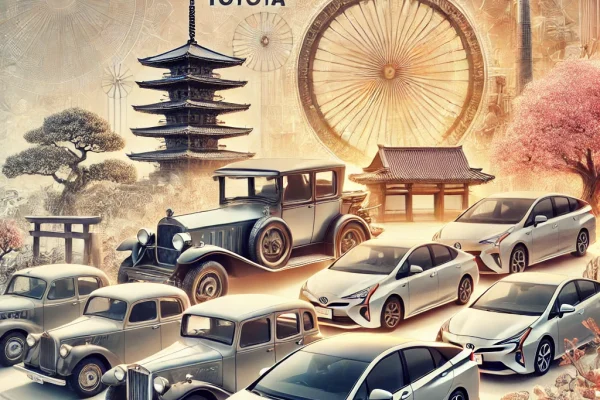Uncovering the Inspiration Behind the Toyota Brand: A Journey Through Heritage and Innovation

Uncovering the Inspiration Behind the Toyota Brand: A Journey Through Heritage and Innovation ? The story of Toyota, one of the world’s most successful automotive giants, is one that stems from visionary ideals, family ambition, and innovation deeply rooted in Japanese culture. Toyota’s beginnings can be traced back to a different industry entirely—textiles—and an inventive genius named Sakichi Toyoda. His ingenuity and resilience set the foundation for what would later become Toyota Motor Corporation, a company renowned globally for its quality, reliability, and technological advances.
- Uncovering the Inspiration Behind the Toyota Brand: A Journey Through Heritage and Innovation
- The Sakichi Toyoda Influence: From Looms to Cars
- Kiichiro Toyoda's Vision for Toyota Motors:Uncovering the Inspiration Behind the Toyota Brand
- Cultural and Historical Influences on Toyota’s Founding
- Toyota's Evolution: From Inspiration to Global Impact
- Toyota's Legacy and Lasting Impact on the Automotive Industry
- Frequently Asked Questions (FAQ)
Established in 1937, Toyota has since evolved to embody Japan’s automotive excellence. The journey from textile machines to advanced cars was catalyzed by Sakichi’s son, Kiichiro Toyoda, who recognized the potential in automotive manufacturing and transformed his father’s dreams into a thriving enterprise. Toyota’s focus on continuous improvement and efficiency has shaped it into a world leader, adopting practices like the “Just-in-Time” system, which became a pillar of lean manufacturing worldwide.
But what was the real inspiration behind Toyota? Beyond a father-son legacy, the brand was influenced by Japanese cultural values such as precision, discipline, and community focus. This unique blend of personal vision and cultural pride allowed Toyota to thrive, ultimately setting standards for the global auto industry.
Further Reading: For more on the foundational values that shaped Toyota, visit the official Toyota Global Website.
The Sakichi Toyoda Influence: From Looms to Cars
Sakichi Toyoda, often celebrated as the “King of Japanese Inventors,” was a key figure in the industrial transformation of Japan. His journey began in the textile industry, where he introduced revolutionary innovations that would later inspire Toyota’s automotive pursuits.
Key Innovations by Sakichi Toyoda:
- Toyoda Wooden Hand Loom: This invention simplified weaving and improved productivity.
- Type G Automatic Loom: Patented in 1924, this loom could automatically stop if a thread broke, minimizing waste and ensuring quality.
“Innovation is seeing what everybody has seen and thinking what nobody has thought.” — Sakichi Toyoda
Financial Catalyst for Toyota’s Automotive Future In 1929, Sakichi sold the patent for the **Type G Automatic Loom** to a British company. This decision provided the financial foundation for Toyota’s entry into the automotive industry, with Sakichi’s son, **Kiichiro Toyoda**, leading the charge.
| Invention | Year | Contribution to Toyota’s Ethos | Impact |
|---|---|---|---|
| Toyoda Wooden Hand Loom | 1891 | Boosted productivity and simplified weaving | Inspired initial innovation |
| Type G Automatic Loom | 1924 | Introduced quality control with automatic stop feature | Set standard for waste reduction |
| Loom Patent Sale | 1929 | Provided funding for entry into the automotive industry | Enabled launch of Toyota Motors |
<h6>Kaizen: The Spirit of Continuous Improvement</h6> Sakichi’s inventions went beyond machines—they instilled the principle of **kaizen**, or continuous improvement, into the DNA of Toyota. This focus on relentless optimization would become a cornerstone of the **Toyota Production System (TPS)**.
The Legacy of Sakichi Toyoda in Toyota’s Manufacturing Philosophy:
- Quality Assurance: Sakichi’s looms emphasized quality control, setting a foundation for Toyota’s high standards.
- Efficiency in Production: The automatic loom reflected a commitment to waste reduction, a hallmark of TPS.
- Innovation and Automation: Inspired Toyota’s focus on automation and innovation in manufacturing.
“The spirit of improvement is the fuel for excellence.” — Sakichi Toyoda
Through Sakichi Toyoda’s legacy, Toyota continues to prioritize quality, durability, and innovation in its vehicles. His pioneering work in textile machinery laid the groundwork for a company that has set global standards in manufacturing, marking a powerful connection between Toyota’s past and present.
Kiichiro Toyoda’s Vision for Toyota Motors:Uncovering the Inspiration Behind the Toyota Brand
The transition from textiles to automobiles was led by Kiichiro Toyoda, Sakichi Toyoda’s son, who took his father’s legacy to the next level. Driven by a vision to make Japan self-reliant in the automotive industry, Kiichiro transformed Toyota from a textile company to a global automotive powerhouse. His leadership and innovative ideas shaped Toyota’s foundation and directed it towards becoming one of the most influential brands in the world.
Key Contributions of Kiichiro Toyoda:
- Formation of Toyota Motor Corporation: In 1937, Kiichiro officially established Toyota Motor Corporation, signaling a full commitment to the automotive industry.
- Introduction of the Toyota Production System (TPS): Embracing his father’s philosophy of kaizen, Kiichiro adapted and expanded the principles of lean manufacturing in the automobile sector.
- Development of Japan’s First Passenger Car: The Toyota Model AA, introduced in 1936, was Japan’s first mass-produced passenger vehicle, marking Toyota’s debut in the automotive world.
“To lead is to inspire others to pursue a vision and to never give up on progress.” — Kiichiro Toyoda
Vision for an Independent Japanese Automotive Industry At a time when Japan heavily relied on foreign vehicles, Kiichiro saw an opportunity for self-sufficiency. His vision wasn’t just about building cars; it was about building a Japanese automotive identity. This commitment to independence and excellence spurred Toyota’s **innovation and resilience** in a competitive market.
| Milestone | Year | Contribution to Toyota’s Growth | Impact |
|---|---|---|---|
| Toyota Motor Corporation Founded | 1937 | Dedicated Toyota’s resources to automotive manufacturing | Solidified brand in auto industry |
| Introduction of TPS | 1948 | Applied lean manufacturing principles | Enhanced production efficiency |
| Launch of Toyota Model AA | 1936 | First passenger car in Japan | Marked Toyota’s automotive entry |
The Toyota Production System (TPS) and Lean Manufacturing Kiichiro Toyoda’s establishment of the **Toyota Production System (TPS)** was groundbreaking. By prioritizing lean manufacturing, he minimized waste and focused on creating a highly efficient assembly line. TPS introduced practices such as:
- Just-in-Time (JIT): Ensuring that production materials arrived exactly when needed, reducing inventory costs.
- Jidoka (Automation with a Human Touch): Empowering workers to halt production if an issue arose, ensuring quality at every step.
- Kaizen (Continuous Improvement): Inspired by Sakichi, kaizen became a core principle, urging workers at every level to improve processes daily.
“Efficiency is doing things right; effectiveness is doing the right things.” — Toyota Production System Principle
The implementation of TPS transformed Toyota into an automotive leader, shaping manufacturing standards that are still studied and emulated today. Kiichiro’s vision of a self-reliant, quality-focused Japanese automotive industry set Toyota on a path to global prominence.
Cultural and Historical Influences on Toyota’s Founding
Toyota’s origins are deeply rooted in Japanese cultural values and historical influences that have shaped the company’s identity. Unlike many global brands, Toyota’s approach to business, quality, and innovation reflects uniquely Japanese principles that prioritize community, precision, and long-term vision. These cultural elements have guided Toyota’s practices and decision-making, making the brand synonymous with excellence and reliability.
Key Cultural Values Influencing Toyota:
- Monozukuri: This Japanese concept of “the art of making things” is integral to Toyota’s focus on craftsmanship and quality.
- Kaizen: Meaning continuous improvement, kaizen encourages small, incremental advancements that collectively drive excellence.
- Respect for People: Toyota’s emphasis on worker empowerment and respect is a hallmark of its corporate culture, where each employee is valued and encouraged to contribute.
“Quality is not an act; it is a habit shaped by values.”
Historical Context and the Rise of Japanese Manufacturing
The post-World War II period posed significant challenges and opportunities for Japan. In the 1950s, Japan was focused on rebuilding its industries, and Toyota became a symbol of this revival. Inspired by Western methods but determined to add a Japanese touch, Toyota’s leaders refined lean manufacturing techniques, emphasizing waste reduction and quality—a philosophy that soon became a global model.
| Cultural Concept | Meaning | Influence on Toyota |
|---|---|---|
| Monozukuri | The craft and pride in making things | Focus on quality and craftsmanship |
| Kaizen | Continuous improvement | Emphasis on small, consistent advancements in processes |
| Respect for People | Valuing each individual’s contribution | Cultivates a culture of empowerment and respect |
The Toyota Production System (TPS) as a Cultural Reflection
Toyota’s adoption of Just-in-Time (JIT) and Jidoka principles are direct outcomes of these cultural values. With JIT, materials arrive only when needed, reducing waste and optimizing resources, while Jidoka ensures that every employee has the authority to stop production if a problem occurs—reinforcing a commitment to quality control.
Why Culture Matters in Manufacturing:
- Precision and Detail-Oriented Processes: Japanese culture values attention to detail, seen in Toyota’s rigorous standards.
- Long-Term Focus: Unlike short-term profit-driven models, Toyota emphasizes sustainable growth and quality.
- Worker Empowerment: Toyota trusts employees to make decisions, fostering a sense of responsibility and dedication.
Interesting Fact: The Toyota Production System has been so influential that it inspired the lean manufacturing movement worldwide, which many Western companies have adopted.
By embracing these cultural values, Toyota set itself apart as a brand driven not just by profit but by a deep commitment to craftsmanship, quality, and respect for individuals. These elements have created a legacy that extends far beyond the automotive industry, reflecting a uniquely Japanese approach to global business.
Toyota’s Evolution: From Inspiration to Global Impact
Toyota’s journey from a small, family-driven business to a global automotive powerhouse is a testament to its founders’ vision and relentless commitment to improvement. Over the decades, Toyota has evolved beyond simply producing vehicles; it has become a symbol of reliability, innovation, and sustainability in the automotive industry.
Key Milestones in Toyota’s Global Expansion:
- 1957: Toyota enters the U.S. market with the Toyota Crown, marking its first international step.
- 1966: The Toyota Corolla is introduced, becoming one of the best-selling cars worldwide due to its affordability and quality.
- 1997: Launch of the Toyota Prius, the world’s first mass-produced hybrid car, showcasing Toyota’s dedication to sustainability.
- 2008: Toyota surpasses General Motors, becoming the world’s largest automaker, a position it has maintained due to its reliable vehicles and efficient manufacturing.
“To remain relevant, you must adapt, innovate, and lead.” — Toyota’s Global Growth Philosophy
Sustainability Initiatives and Environmental Impact
Toyota has made strides in sustainable manufacturing and vehicle production, particularly through its hybrid technology. The Toyota Prius led the way, and today, Toyota continues to invest in eco-friendly technology with hydrogen fuel cell vehicles like the Mirai and a commitment to carbon neutrality by 2050.
| Year | Milestone | Significance |
|---|---|---|
| 1957 | U.S. Market Entry | Marked Toyota’s first major international expansion |
| 1966 | Launch of the Corolla | Established Toyota’s global reputation for quality and reliability |
| 1997 | Introduction of the Prius | Pioneered the hybrid car market and showcased eco-innovation |
| 2008 | Becomes World’s Largest Automaker | Solidified Toyota’s status as a leader in quality and efficiency |
Toyota’s Influence on Global Manufacturing Practices
Toyota’s manufacturing innovations, particularly Just-in-Time (JIT) and lean manufacturing, have been studied and adopted globally. These practices not only reduced production costs but also improved quality and efficiency, impacting industries beyond automotive.
- JIT Production: Reduced inventory costs by ensuring parts arrived just in time for production.
- Jidoka (Automation with a Human Touch): Empowered workers to maintain quality by halting production if a defect was found.
- Standardized Work and Kaizen: Helped establish Toyota’s focus on continuous improvement, influencing businesses worldwide.
Toyota’s Global Reach Today
With factories in numerous countries and vehicles sold across continents, Toyota is now a globally recognized brand synonymous with innovation, quality, and environmental responsibility. The company’s influence extends to various industries that have adopted its principles to enhance efficiency and reduce waste.
For additional reading on Toyota’s commitment to sustainability, visit Toyota’s Environmental Policy.
By integrating these forward-thinking practices and setting new standards, Toyota has grown from a Japanese automaker to a pioneering global leader in automotive and environmental technology. Its evolution is a shining example of how strong foundations and an adaptive mindset can drive a company to enduring global impact.
Toyota’s Legacy and Lasting Impact on the Automotive Industry
Toyota’s legacy extends far beyond its vehicles; it has left a profound impact on global manufacturing, sustainability, and innovation. Through a unique blend of Japanese cultural values and forward-thinking leadership, Toyota has not only achieved remarkable success but has also inspired industries around the world to pursue efficiency, quality, and environmental stewardship.
Toyota’s influence is seen across numerous sectors that have adopted its lean manufacturing and continuous improvement principles. By setting new standards, Toyota has inspired a movement toward sustainable manufacturing practices, sparking advancements in the automotive sector and beyond.
Toyota Hybrid Technology: Paving the Way for a Greener Future
With the introduction of the Toyota Prius in 1997, Toyota pioneered hybrid technology, showcasing the brand’s commitment to reducing its environmental footprint. The Prius was more than a car; it was a statement on the future of eco-friendly transportation, inspiring other automakers to invest in hybrid and electric vehicle technology. Today, Toyota’s investment in hydrogen fuel cells and its goal of carbon neutrality by 2050 reflect its ongoing dedication to sustainability.
| Milestone | Year | Significance |
|---|---|---|
| Launch of the Prius | 1997 | Pioneered hybrid technology and eco-friendly vehicles |
| Investment in Hydrogen Fuel Cells | 2000s | Positioned Toyota as a leader in fuel cell technology |
| Carbon Neutrality Goal by 2050 | Future | Sets Toyota’s commitment to long-term environmental stewardship |
Impact on the Automotive Industry and Beyond
Toyota’s lean manufacturing practices have reshaped the auto industry. Concepts such as Just-in-Time production, Kaizen, and Jidoka are now standard practices in manufacturing worldwide. Toyota’s emphasis on efficiency and waste reduction has influenced a wide array of industries, encouraging them to adopt sustainable and efficient processes.
Toyota’s Continued Commitment to Innovation:
- Development of Electric Vehicles (EVs): Toyota has launched EV models as part of its commitment to clean energy.
- Advanced Driver Assistance Systems: Toyota continues to improve vehicle safety with advanced technology like Toyota Safety Sense.
- Autonomous Vehicles: Toyota is investing in AI and autonomous driving technology to shape the future of mobility.
“Toyota’s dedication to improvement and sustainability has set a standard for the industry and beyond.”
For a deeper look into Toyota’s innovation journey and its impact, check out the Toyota Official Newsroom.
Toyota’s legacy is defined by more than its vehicles; it is a legacy of excellence, environmental responsibility, and continuous advancement. By staying true to its values while leading in technological innovation, Toyota has solidified its place as a pioneering force in the automotive world and a role model for sustainable business practices worldwide.
Frequently Asked Questions (FAQ)
1. Who inspired the Toyota brand?
The Toyota brand was primarily inspired by Sakichi Toyoda and Kiichiro Toyoda. Sakichi, a pioneer in Japanese industry, developed advanced textile machinery, while his son Kiichiro expanded the family business into automotive manufacturing, laying the foundation for Toyota Motor Corporation.
2. What is the Toyota Production System (TPS)?
The Toyota Production System (TPS) is Toyota’s unique approach to manufacturing that focuses on efficiency, waste reduction, and quality. Key principles of TPS include Just-in-Time (JIT) production, Jidoka (automation with a human touch), and Kaizen (continuous improvement). TPS has become a model for lean manufacturing worldwide.
3. How did Toyota become a global brand?
Toyota grew internationally by focusing on quality, reliability, and efficiency. Starting with its entry into the U.S. market in 1957, Toyota gained worldwide recognition with models like the Corolla and the Prius, the first mass-produced hybrid car, which helped position Toyota as a leader in sustainable technology.
4. How has Toyota contributed to environmental sustainability?
Toyota is committed to sustainability through its hybrid technology (beginning with the Toyota Prius in 1997) and investments in hydrogen fuel cell technology. Toyota has set ambitious goals, including carbon neutrality by 2050, to further reduce its environmental impact.
5. What cultural values shape Toyota’s approach to business?
Toyota’s approach is deeply influenced by Japanese values such as Monozukuri (craftsmanship), Kaizen (continuous improvement), and Respect for People. These principles foster a company culture of quality, precision, and empowerment that has shaped Toyota’s success.
6. Where can I learn more about Toyota’s environmental initiatives?
You can read more about Toyota’s sustainability goals and initiatives on their official website: Toyota’s Environmental Policy.
7. How did the Toyota brand transition from textiles to automobiles?
The Toyoda family initially focused on textile machinery. However, in 1937, Kiichiro Toyoda shifted the focus toward automotive manufacturing, establishing Toyota Motor Corporation. This transition was funded by the sale of a loom patent, which provided the resources to begin automotive production.





